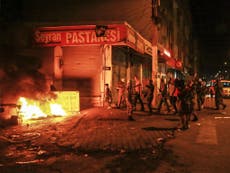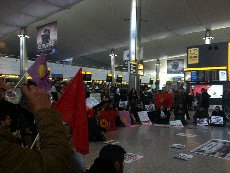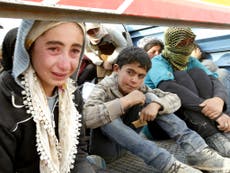The Syrian – but in reality Kurdish – city of Kobani, surrounded on three sides by Isis forces, is on the brink of falling. This would be a signal victory for the militant jihadists, and portend further atrocities in a region that has suffered all too many of them.
Yet potential tragedy also contains an element of the surreal, capturing the fiendish complexity of events unfolding along Syria’s long and porous border with Turkey, which cuts through a predominantly Kurdish region. The air strikes that are meant to halt the Isis advance – but which have had limited effect so far – are being led by the United States, a power 6,000 miles away and which has no vital interest in the region. Supporting the US are other faraway Nato countries, including Britain.
Turkey, however, from whose territory the black Isis flag can be seen as it flies over an outlying Kobani district, most certainly does have a direct, vital and immediate interest. Yet the country with the second-largest land army in Nato sits on its hands, seemingly unmoved by the prospect of sharing a border with the most ferocious Islamist group thus far thrown up by a decade of convulsions across the Middle East.
Turkey’s inaction reflects a profound dilemma. It is a Muslim country, but it has no relish at having Isis, whose savagery appals the vast majority of Turks, as a neighbour. On the other hand, Isis is effectively doing Ankara’s dirty work for it. The group is a sworn foe of the Assad regime, whose overthrow has been Turkey’s goal from the outset of Syria’s three-and-a-half-year-old civil war.
Moreover the fall of Kobani would be a heavy strategic blow to the Kurds, and to their goal of forging an independent and united Kurdish state, which Turkey has long, and at times bloodily, opposed. Yet that concern must be balanced against the risk of a new uprising by Turkish Kurds. Today clashes took place in several Turkish cities between police and protesters against Ankara’s apparent reluctance to save Kobani – in contrast to President Recep Tayyip Erdogan’s undertaking only a few days ago.
Finally, Mr Erdogan must factor in the risk of Isis attacks inside Turkey. Early in the Syrian conflict, Turkey permitted Syrian opposition elements of every stripe to seek refuge and operate from its soil. Among them were radical jihadists too, who may well strike back with terrorist attacks inside Turkey should its President finally order an intervention.
Inevitably, the current crisis also raises the issue of what more the US and its allies can do. Air strikes have had some limited success in striking Isis installations, but as many (including this paper) have warned, they cannot do the job alone. So should the US and the West launch an invasion, and plunge into the morass of another Middle Eastern war? The answer remains an emphatic no, even if some special forces may be infiltrated on the ground, to better co-ordinate and target the air attacks.
The solution must be regional. Ideally, the coalition of Middle Eastern countries that Washington has assembled would do the job. Alas, the reality is that while members of this coalition have a common enemy in Isis, their agendas and ultimate aims differ mightily. And even if they could find a common will, the recent military performance of Iraq, the country most threatened by Isis, does not give ground for optimism. The campaign, in President Obama’s words, to “degrade and destroy” the organisation may take years. It could however be drastically shortened – if only Turkey made up its mind to act.






Join our commenting forum
Join thought-provoking conversations, follow other Independent readers and see their replies